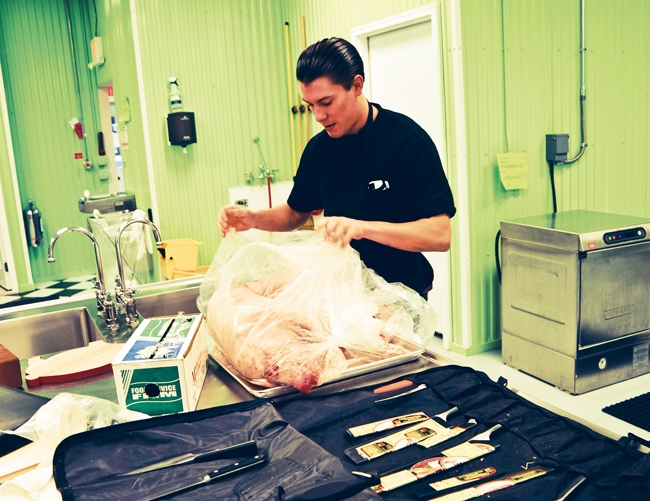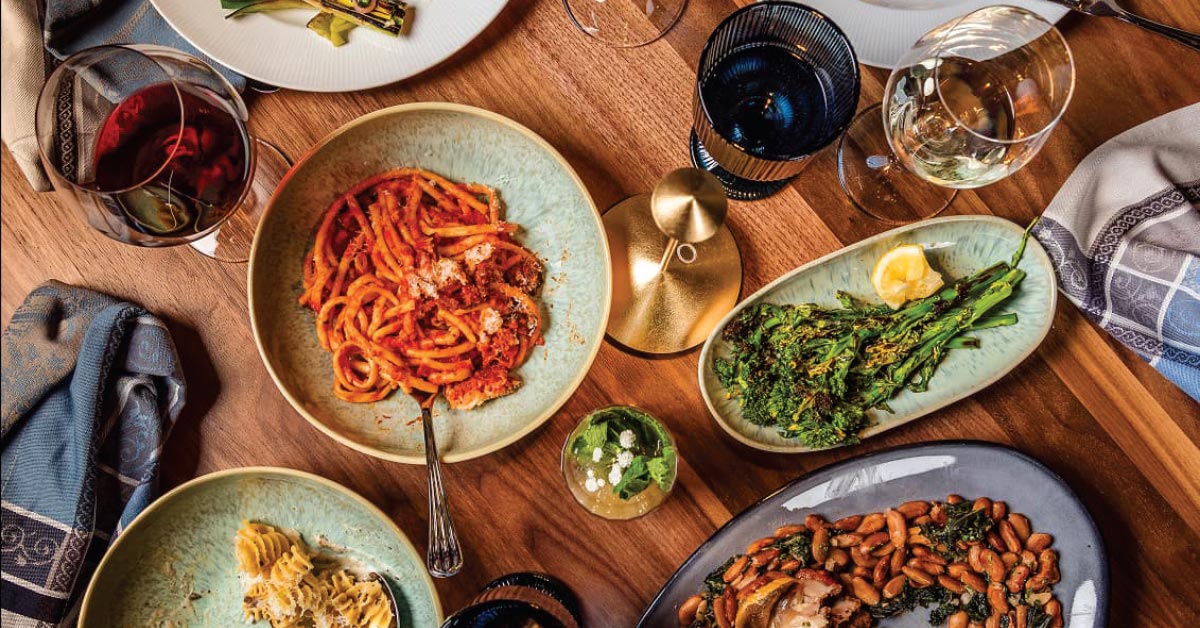For local would-be food entrepreneurs, incubators give them a chance to get their ideas out of the kitchen and into the market.
These incubators, which are typically called food and/or kitchen incubators, got their start in Michigan in 2005 when Ron Steiner, Regional Entrepreneurship Educator with Michigan State University Extension, opened the Starting Block, a kitchen incubator in Hart. Steiner, executive director of the Starting Block, said there are now five similar operations in the southwest Michigan area which have opened within the past two to three years.
"One of my initiatives for MSU Extension was to be the champion of a regional kitchen incubator," Steiner said. "I was part of a group which felt that strategically the need for kitchen incubators was there to generate a new environment focusing on specialty food products."
Those specialty foods Steiner references are made primarily for shelf sale or wholesale and include items such as baked goods, jellies and jams and pickled products. In addition to being licensed to produce these food products, the Starting Block also is a meat processing facility. Steiner said the meat processing is regulated and licensed by the United States Department of Agriculture and the specialty food production is regulated and licensed by the Michigan Department of Agriculture.
At 11,000 square feet, Steiner's facility is among the larger food/kitchen incubators. Though incubators vary in size, they operate in pretty much the same way. Clients pay an hourly rate, which may start at $27.50 and decrease from there depending on the amount of commercial kitchen space they rent. This fee most often includes kitchen utensils and pots and pans, although the selection varies from incubator to incubator.
Janet Tlapek, president and owner of Facility Kitchens in Lowell, said she doesn't provide much in the way of cooking gear because every client is working on something different.
"They tend to bring their own utensils," Tlapek said. "I have pots and pans here, but many of them like to use their own, particularly if they're cooking with heavy garlic."
Unlike Steiner, who brought plenty of experience with food to his facility, Tlapek is neither a cook nor a foodie. She is a professional accountant who saw an opportunity to provide a service and make money.
"It appealed to me so much because you can begin a business and outsource the whole facility," she said. "As an accountant, that made overwhelming sense."
In 2010, one year after researching the incubator concept, Tlapek decided to renovate an existing building, which now houses her 3,000-square-foot facility. Her hourly rates start at $27.50. She said individuals who want to start a food business will do much better if they don't spend their own money to build a facility and focus instead on marketing and sales and packaging and distribution.
KellyLecoy, owner of Uptown Kitchen, an 800-square-foot incubator in Grand Rapids that opened in February 2012, said by providing kitchen equipment and space to work in, clients are saving anywhere between $20,000 and $100,000.
"We're providing business and kitchen resources, marketing and social media, and helping them through licensing," Lecoy said. "We don't want to be a place where businesses are constantly starting and failing."
In addition to offering kitchen space, Tlapek also accepts deliveries, as well as store equipment and ingredients. She has three people who perform work for her, but aren't directly employed by her, which keeps costs low.
"The greatest thing that incubators do is give people time to develop a track record and a business plan so that by the time they go to a bank to get financing, they're no longer a start-up," Steiner said."We want them to launch their business and make all their mistakes at an incubator."
Since the Starting Block opened, 17 clients have graduated and gone on to own their own licensed kitchen facility or have turned production of their food products over to a co-packer so they can handle the business end of their enterprise. A co-packer refers to a facility that has equipment to produce high volumes of product.
Steiner said he has established a three-year timeframe for a client to graduate, but says most of them graduate in far less time.He said his incubator can accommodate up to three or four clients at the same time if they're doing a different product. The Starting Block is open 24/7 and has a client base of around 30, some of whom only come in once a month.
John Coram, owner of Johnny Secreto Foods, spent about one year perfecting his pasta sauces, barbeque sauces and spice mixes at Facility Kitchens before launching the product line in May 2012. Not long after that he began using a co-packer to produce the sauces, although he still mixes his spice blends at Tlapek's facility.
Tlapek said by the time people come to her, they are already commercializing their product.
"The people I see are working on everything from catering, where they cook and take the food and immediately serve it, to barbequing or cooking inside," Tlapek said. "They also package food for wholesale and retail sales or they could be making fresh salsa, pizzas for freezing, jams and jellies and spices.
"Because we are a licensed vendor, we serve as a place where hot dog stand owners can come in and change out their old water or re-stock their cart."
Lecoy said the local food movement is all about how the local food economy affects the overall economy.
"You're voting with dollars and the choices you make every time you put something in your mouth," Lecoy said. "Food affects our health. Through these businesses, we are working toward a healthy livelihood."
Secreto Foods Uses Food Incubator to Launch Business
Secreto Foods produces and distributes a line of pasta and barbeque sauces and four different spice blends sold at grocery stores and farmers markets.
Owner John Coram's pasta sauce was recently chosen for inclusion in Meijer supermarkets "Made in Michigan" product lineup and got off the ground thanks to Family Kitchens incubator in Lowell.
"We introduced the product line one year ago this May. It's been an incredible adventure," said Coram, who got his start at the Facility Kitchens food incubator in Lowell.
Coram, who formerly worked in marketing and sales for Valley City Signs, said he did not have the capital necessary to start a business when he decided in 2011 to try his hand at mass producing the sauces and spice mixes.
"A licensed kitchen is the foundation for a company like mine," Coram said. "A lot of people want to get started, but they don't understand the large time and money investment it takes before you can get a product going."
His wife encouraged him to think about starting his own business after watching him give away the sauces and spice mixes as birthday and holiday gifts.
As the popularity of the product line increased, Coram had the happy dilemma of finding a way to mass produce the sauces. He still blends the spice mixtures at Facility Kitchens.
"It took a lot of hard work to get to this point," he said. "I can't say enough about the importance of having access to Facility Kitchens."
By Jane Simons
Food Incubator Success Stories
These businesses took advantage of local incubators to get their products out to the masses.
The Canning Diva
Incubator: Facility Kitchens (Lowell)
Diane Devereaux's canning business has been featured on WZZM 13 and specializes in capturing the flavors and freshness of fresh seasonal produce in salsas, jams, soups and many other recipes.
CG Catering
Incubator: Facility Kitchens (Lowell)
A professional-grade catering company owned by Chef Chris Gribble, CG Catering has served at events all over the state and is known for stylish, high quality dishes.
Deliciosity
Incubator: Uptown Kitchen (Grand Rapids)
Jeremy Kuhn started Deliciosity, which specializes in raw and vegan desserts, after deciding to cut animal products out of his diet. The healthy, sweet treats can be found at Bartertown in Grand Rapids.
Dough Chicks
Incubator: Can-Do Kitchen (Kalamazoo)
Mother and daughter team Denise and Kara Steeley use Can-Do to produce all-natural cookies, granola and truffles distributed to stores in Battle Creek, Kalamazoo and Portage.
Good Life Granola
Incubator: The Starting Block Kitchen (Hart)
Holland's Good Life Granola began in Starting Block's kitchens and is now sold in Meijer and other grocery stores along the lakeshore. In 2011, it was featured on "The Today Show."
Making Thyme Kitchen
Incubator: Uptown Kitchen (Grand Rapids)
The Grand Rapids (966 Cherry St. SE) retailer offers fresh or frozen entrees made from scratch from local goods for a home cooked meal regardless of your time crunch. Delivery is an added bonus.
Pit Stop Catering
Incubator: Facility Kitchens (Lowell)
Pit Stop specializes in foods that could be found at a summer barbeque, including salmon, salads, mac n' cheese and meat smoked over Michigan cherry pits for extra flavor.
Rita Girl's Bakery
Incubator: Kitchen Sinc (Grand Rapids)
Taking advantage of 24-hour availability and retail space inside MoDiv, Rita Tornga founded her bakery in 2010, selling cookies and cupcakes and filling a niche in downtown Grand Rapids.
Secreto Foods
Incubator: Family Kitchens (Lowell)
John Coram used Family Kitchens food incubator to create and distribute his line of pasta and barbecue sauces, which were recently picked up by Meijer.
— Compiled by Carly Plank





